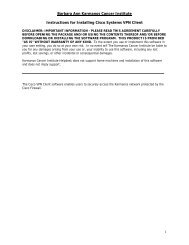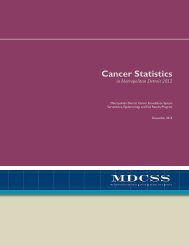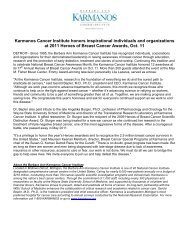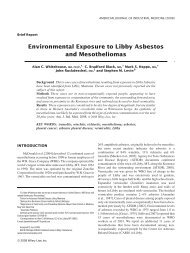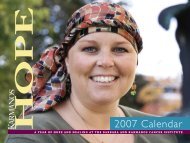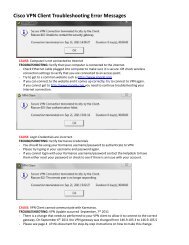Cancer Statistics - Karmanos Cancer Institute
Cancer Statistics - Karmanos Cancer Institute
Cancer Statistics - Karmanos Cancer Institute
Create successful ePaper yourself
Turn your PDF publications into a flip-book with our unique Google optimized e-Paper software.
Differences in Completeness of Follow-up<br />
in a Population-Based <strong>Cancer</strong> Registry<br />
George W. Dombi, Cecilia Yee, Richard K. Severson, Jeannette Korczak and Ikuko Kato (Principal Investigator)<br />
Population-based cancer registries play a pivotal role in providing<br />
unbiased information on the occurrence of cancer arising in a<br />
defined population 1 . This information is crucial to monitor emerging<br />
patterns of cancer incidence, prevalence and survival. In the<br />
US, the Surveillance, Epidemiology and End Results (SEER) data<br />
have revealed differences in cancer incidence and survival between<br />
Caucasians and African Americans 2 . The most commonly diagnosed<br />
cancers in US women and men are breast and prostate cancers,<br />
respectively, and racial disparities in the 5-year relative survival for<br />
these two types of cancer have long been recognized 3, 4 . Validity of<br />
these comparisons depends on the assumption that completeness<br />
of follow-up is not only highly satisfactory, but also comparable between<br />
races. Because cases lost to follow-up may not be representative<br />
samples of the whole patient population, any racial differences<br />
in follow-up could potentially introduce bias into the observed<br />
racial disparities in cancer survival. Thus, we conducted a study to:<br />
(i) identify characteristics of breast cancer and prostate cancer patients<br />
who are lost to follow-up and (ii) assess whether there is any<br />
differential follow-up between African Americans and Caucasians,<br />
after adjustment for other factors related to loss to follow-up.<br />
Test set included 36,925 female breast cancer patients and 40,943<br />
prostate cancer patients, either Caucasian or African Americans,<br />
who were diagnosed between 1992 and 2002 and at age greater<br />
than 20 years were included in the study. During the average 6.6<br />
years of follow-up, 2.4% of the breast cancer patients and 1.4% of<br />
the prostate cancer patients were lost. Losses to follow-up occurred<br />
more frequently in Caucasians than African Americans, particularly<br />
for breast cancer. Unknown social security number (SSN) was<br />
the strongest predictor. Patients younger than 65 years, married<br />
women and men with unknown marital status were more likely to<br />
be lost. Local tumor stage and non-hospital reporting source were<br />
associated with higher risk of loss to follow-up in the logistic regression,<br />
but not in the time-dependent Cox proportional model. While<br />
a history of multiple primary cancers appeared to reduce the risk of<br />
loss to follow-up, no surgery or no radiation treatment records were<br />
associated with an increased risk of follow-up loss for either cancer.<br />
These observations are contrary to our working hypothesis that<br />
African Americans, as well as patients with lower socio-economical<br />
status, may be more likely to be lost to follow-up. The causes for<br />
the unexpected lower rate of African Americans lost to follow-up<br />
remains to be elucidated. It is not surprising that an advanced stage<br />
of disease showed a strong inverse association with loss to followup<br />
because all deceased cases were considered to be completely<br />
followed. Major determinants of loss to follow-up were concerned<br />
with incomplete patient information. According to the results of<br />
this study, it is highly recommended that complete and accurate<br />
personal identifying information be obtained; otherwise additional<br />
information concerning potential contacts of the patients would be<br />
helpful. Aside from that, results from the logistic regression analyses<br />
may prove to be especially useful in planning targeted follow-up<br />
to identify those patients who are likely to be lost following the<br />
initial diagnosis and treatment period.<br />
23<br />
100 MDCSS (1992 – 2002) Breast <strong>Cancer</strong> Patients Lost to Follow-up<br />
100 MDCSS (1992 - 2002) Prostate <strong>Cancer</strong> Patients Lost to Follow-up<br />
80<br />
Caucasian<br />
African American<br />
1.7%<br />
2.6%<br />
80<br />
Caucasian<br />
African American<br />
1.5%<br />
1.0%<br />
PERCENTAGE<br />
=65 years old<br />
40 Not married<br />
1.0%<br />
1.5%<br />
4.3%<br />
PERCENTAGE<br />
1.1%<br />
1.0%<br />
2.9%<br />
Married<br />
3.1%<br />
3.8%<br />
1.1%<br />
20 Unknown<br />
=65 years old<br />
40 Not married<br />
Married<br />
20 Unknown<br />
4.3%<br />
SSN known<br />
SSN unknown 1975 1980<br />
2.1% 39.7%<br />
SSN known 0.9% 51.5%<br />
SSN unknown 1975 1980<br />
0% 1% 2% 3% 4% 5% …<br />
Lost to Follow-up<br />
37% 38% 39% 40% 0% 1% 2% 3% 4% 5% … 49% 50% 51% 52%<br />
Lost to Follow-up<br />
References:<br />
1. Parkin DM. The evolution of the population-based cancer registry.<br />
Nat Rev <strong>Cancer</strong>. 2006;6:603-12.<br />
2. Ries LAG, Harkins D, Krapcho M, et al (eds). SEER <strong>Cancer</strong> <strong>Statistics</strong> Review,<br />
1975-2003, National <strong>Cancer</strong> <strong>Institute</strong>. Bethesda, MD, http://seer.cancer.gov/<br />
csr/1975_2003/,based on November 2005 SEER data submission, posted to<br />
the SEER web site, 2006.<br />
3. Young JL Jr, Ries LG, Pollack ES. <strong>Cancer</strong> patient survival among ethnic groups<br />
in the United States. J Natl <strong>Cancer</strong> Inst 1984 ;73:341-352.<br />
4. Clegg LX, Li FP, Hankey BF, Chu K, Edwards BK. <strong>Cancer</strong> survival among US whites<br />
and minorities: a SEER (Surveillance, Epidemiology, and End Results) Program<br />
population-based study. Arch Intern Med. 2002 Sep 23;162(17):1985-93.




